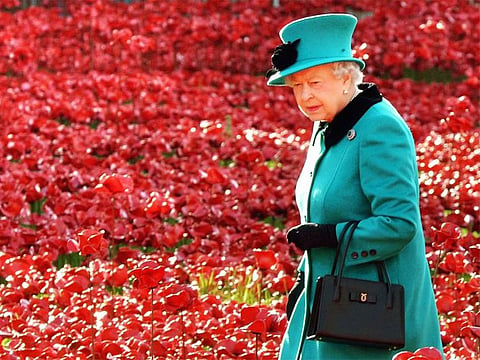Queen Elizabeth II: An extraordinary life of extraordinary service
The Queen had a great sense of duty and did her job, stoicly, earnestly and relentlessly

She became the queen before many of us were born, before many of our mothers were born, before many of our grandmothers were born, a fixed point on a spinning axis. Whether you loved her or not, she was always there. Death and taxes and Queen Elizabeth II were the only certainties of life for 70 years, until she died on Thursday at the age of 96.
Chances were that what you loved or hated wasn’t the woman herself but the institution she embodied, a sprawling $28 billion firm of inherited titles and property. The woman herself? Her position prevented her from vocalising opinions on politics, elections, social movements and individual people — anything of consequence.
You knew she was outdoorsy: corgis, horses, hunting expeditions. You might have read somewhere that as a teenager she served as a mechanic in World War II. She saved her wartime rations to pay for her wedding dress and thereby won the love of a nation that, in those dark days, needed a fairy tale but a practical one.
You knew, vaguely, that the job was never supposed to be hers. She came to the throne by way of an abdicating uncle, a dead-too-soon father, a lack of a male heir. In 1952 the country’s legacy suddenly rested on the sensible shoulders of a 25-year-old mother of two.
Was it a fairy tale? Was it feminism? The highest-ranking woman in the world, and her power came not via a wedding ring on her finger but via a chaotic ladder of genealogy reaching through centuries: abdications and overthrowings, all leading up to this singular woman holding the throne longer than anyone had before, or likely ever will again.
Being a queen is a grown woman’s job, and not for the faint of heart. There’s a certain amount of keeping everyone in line, of grinning and bearing it, whatever “it” is at the moment. In Elizabeth’s case it was a parade of prime ministers, a series of national tragedies, a daughter-in-law named Diana whose untimely death caused the sort of frenzied grief.
The role of queen is not about finding oneself — the arc of princesses, both real and fictitious — but rather about sublimating oneself: in the duty of work and in the duty of country.
She was forever tied to Britain’s past and forever responsible for the monarchy’s future. A king must rule; a queen must rule and also lend her body to the act of motherhood, which Elizabeth did four times. For her first birth, her husband Philip was off reportedly playing squash.
And then those children grew up, and their hair grew grey while Elizabeth’s grew white, and it started to seem as if she could live forever or die at any moment.
In the past few years, especially, her mortality became more obvious. She reduced her public engagements. In June 2021, her husband of 73 years died, and in a photograph that circulated widely from the funeral, Elizabeth sat socially distanced and alone in St. George’s Chapel, wearing double masks, watching the casket carrying Prince Philip make its way down the aisle with nobody in arm’s reach to comfort her. At this point she already looked fragile.
By the time Buckingham Palace announced Thursday morning that the Queen’s health was poor, it was evident that we were talking about hours of time rather than weeks, as her family hastened to her bedside.
You know what got to me, in a way I didn’t expect? When I realised that through the course of my whole lifetime, the words to the de facto English anthem have been “God save the Queen,” but now and for the rest of my life, and maybe for the rest of my daughter’s — through the reigns of Charles, then William, then George, as a series of powerful men replace this powerful woman — they’ll be “God save the King.”
The Queen’s appearance was wholesome rather than striking. She did not build her brand in the ways we now expect famous, powerful women to do; instead she sought to preserve an antique brand — for better or worse, but not for herself.
This, to me, is the legacy. This is the remarkable thing. That for 70 years the most important figure in Britain was a woman who did not do many of the things or embody many of the characteristics that society often demands women do and be.
For 70 years the Commonwealth’s most important resident was a woman who was made sublime only because the people allowed her to be.
She did her work. She did her work stoically, stoutly, relentlessly, uncomplaining, for 25,000 days while her contemporaries retired or died, and her children divorced, and one of her grandsons resigned and moved into Tyler Perry’s house in California and the other grandson stayed put.
She did her work. Whatever any of us think of the British monarchy, we can think something of showing up to do the work. “I declare before you all that my whole life, whether it be long or short, shall be devoted to your service,” she once told her future subjects in a radio address broadcast on her 21st birthday. “And the service of our great imperial family to which we all belong.”
She insisted she was merely a humble public servant. And the most extraordinary thing is that maybe that’s what she was all along.
Washington Post
Monica Hesse is a noted author who writes about culture and society
Sign up for the Daily Briefing
Get the latest news and updates straight to your inbox



